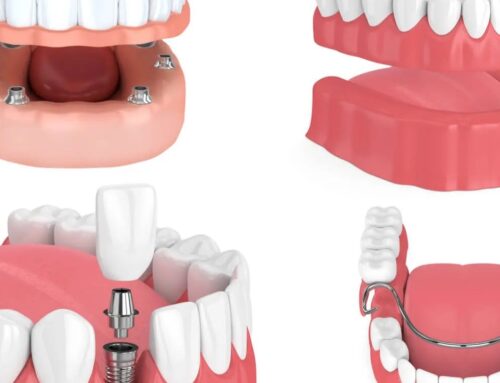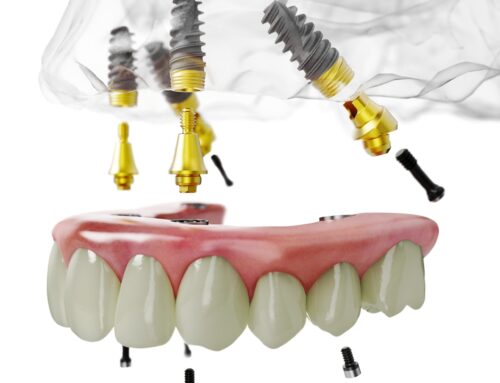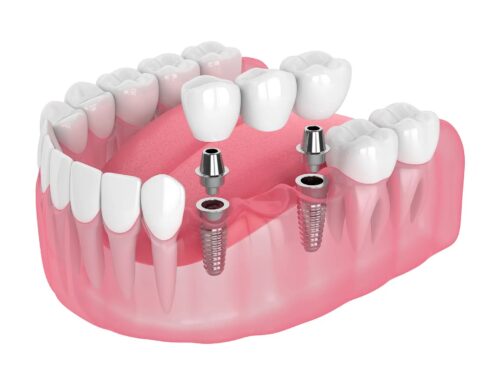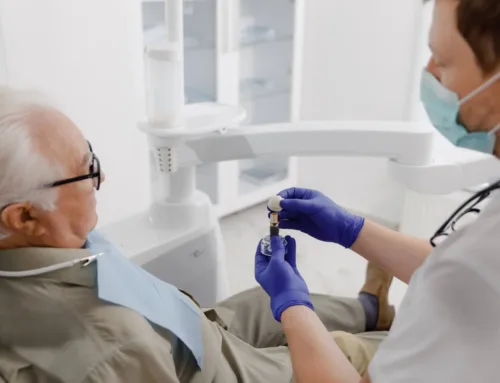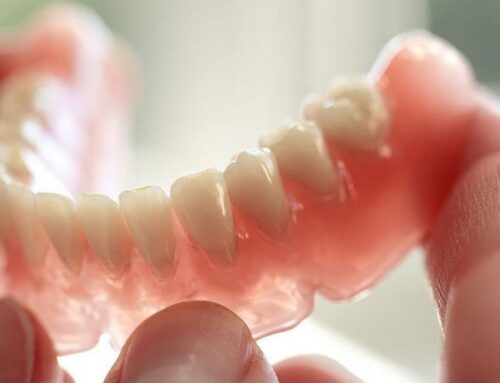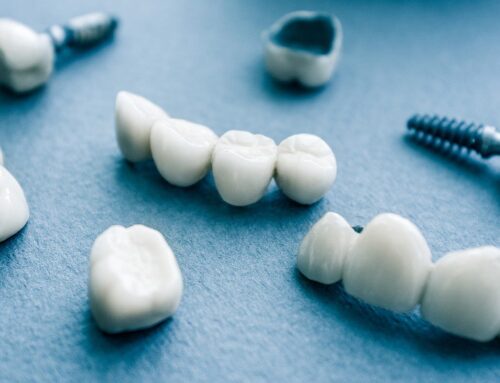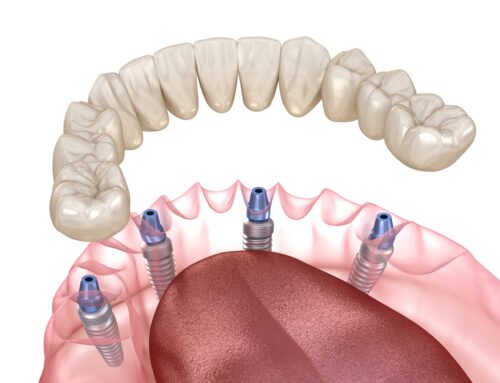Bridges and Crowns Explained
A Comprehensive Guide
Dental care decisions can feel overwhelming, especially when it comes to expensive, restorative treatments like crowns and bridges. Whether you’ve experienced tooth damage, decay, or even loss, crowns and bridges offer reliable and effective solutions to restore your smile and oral health.
Below, we’ll explain the difference between bridges and crowns, how they’re used, and what is involved with the process for both. We’ll also go over the costs associated with both options to help you make an informed decision.
Ultimately, if you’re in need of either treatment, we highly recommend booking an appointment so we can create a personalized treatment plan tailored to your specific needs and budget.
What are Dental Crowns?
A dental crown is a tooth-shaped “cap” that is placed over a damaged or decayed tooth to restore its shape, size, strength, and appearance. Once cemented in place, the crown fully encapsulates the visible portion of the tooth, providing protection and functionality while blending seamlessly into your smile.
Dental crowns serve various purposes, depending on your individual needs. Some common situations where crowns are used include:
- Protecting a weak tooth that is at risk of breaking, such as a tooth with a large filling or one that has undergone a root canal.
- Restoring a broken or severely worn tooth, giving it a natural shape and proper function.
- Covering and supporting a tooth with a large filling where there isn’t enough of the natural tooth left to support a traditional filling.
- Enhancing the appearance of misshapen or discoloured teeth, as crowns can be made to match the colour and shape of your natural teeth.
Crowns can also be used to cover dental implants, which are artificial tooth roots that provide a sturdy foundation for fixed or removable replacement teeth.
Types of Crowns Available
Crowns can be made from various materials, each offering different benefits:
- Porcelain or ceramic crowns – These are the most natural-looking option, making them ideal for front teeth. They can be colour-matched to blend with your natural teeth, offering an excellent aesthetic option.
- Metal crowns – Made from gold or other metal alloys, these crowns are incredibly durable, making them ideal for molars where high bite strength is applied. However, they are more noticeable than porcelain options.
- Porcelain-fused-to-metal crowns (PFM) – These crowns combine the strength of metal with the aesthetic appeal of porcelain, offering a good balance between durability and appearance.
- Zirconia crowns – Known for their strength and appearance, zirconia crowns are highly durable and are often chosen for both aesthetic and functional reasons.
Getting A Crown
The process of getting a dental crown generally involves two different visits to the dentist.
- Initial consultation and tooth preparation – During the first visit, your dentist will examine the affected tooth, take X-rays, and prepare the tooth by reshaping it to accommodate the crown. Impressions of the tooth are taken, which are sent to a dental lab to create a custom crown.
- Fitting the crown – Once the custom crown is ready, you will return for your second appointment, where the dentist will ensure the crown fits properly and matches your natural teeth in colour and shape. The crown is then cemented in place, providing you with a durable and aesthetically pleasing restoration.
How Long Do Crowns Last?
With proper care, dental crowns can last between 10 and 15 years. It’s essential to maintain good oral hygiene by brushing and flossing daily. You must also attend regular check-ups to ensure the longevity of your crown.
What Are Dental Bridges?
A dental bridge is a fixed dental prosthesis used to replace one or more missing teeth by anchoring them to the adjacent teeth or dental implants. A bridge literally “bridges” the gap created by one or more missing teeth. This helps restore both function and appearance. Similar to crowns, bridges are custom-made to blend with your natural teeth and provide a long-lasting solution for tooth loss.
Bridges are an excellent option for patients who are missing teeth but want to avoid removable dentures or surgical implants. They serve multiple functions, including:
- Restoring your smile by filing in gaps left by missing teeth.
- Improving your ability to chew and speak properly. Missing teeth can affect pronunciation and bite alignment.
- Preventing other teeth from shifting into the gap left by the missing tooth, which could lead to bite problems or jaw discomfort.
- Maintaining the shape of your face by supporting the structure of your jaw and preventing bone loss.
Types of Dental Bridges Available
- Traditional bridges – This is the most common type, consisting of a false tooth (pontic) held in place by dental crowns on the adjacent natural teeth (abutments).
- Cantilever bridges – Similar to traditional bridges, cantilever bridges are anchored by a single abutment tooth instead of two. These are typically used in areas where there is only one natural tooth next to the missing one.
- Maryland bridges – These use a metal or porcelain framework attached to the backs of adjacent teeth, rather than crowns. They are less invasive but may not be as strong as other types of bridges.
- Implant-supported bridges – Instead of being anchored by natural teeth, these bridges are supported by dental implants, making them a good option for patients with multiple missing teeth.
Getting A Bridge
Getting a dental bridge typically involves the following steps:
- Initial consultation and tooth preparation – Much like crowns, the process begins with an examination and preparation of the abutment teeth (the teeth adjacent to the gap). These teeth are reshaped to accommodate the crowns that will hold the bridge in place.
- Impressions and temporary bridge – Impressions of your teeth are taken and sent to a lab to create the custom bridge. A temporary bridge may be placed to protect your teeth while the permanent bridge is being made.
- Placing the permanent bridge – Once the custom bridge is ready, you will return to have it fitted. The dentist will check the fit, adjust as necessary, and then cement it in place. An implant-supported bridge requires a longer process, as it involves placing implants first and allowing them time to heal before attaching the bridge.
How Long Do Bridges Last?
With proper care, dental bridges can last anywhere from 5 to 15 years. Good oral hygiene and regular dental check-ups, as well as avoiding habits like chewing on hard objects, can prolong the life of your bridge.
Cost Considerations for Crowns
The cost of a dental crown can vary depending on several factors, including the material used and the complexity of the procedure. In Canada, the typical price range for a single crown is between $1,000 and $2,500. Porcelain and zirconia crowns tend to be on the higher end of the spectrum due to their aesthetic appeal and durability.
Cost Considerations for Bridges
The cost of a dental bridge depends on the number of teeth being replaced and the type of bridge used. On average, you can expect to pay between $4,000 and $5,000 for a traditional bridge. Implant-supported bridges are more expensive, ranging from $8,000 to $15,000 or more, depending on the number of implants and units required.
The only way to get a more accurate cost estimate is to book your free initial consult so we can perform an exam, and sit down together to review the available options specific to your case. Book your appointment today to find out (no obligations).
Factors Affecting Cost
There are several factors that go into the cost of both dental procedures, including:
- Number of teeth involved – Bridges replacing multiple teeth will be more expensive than those replacing a single tooth.
- Materials used – Higher-quality materials such as zirconia or porcelain can increase the cost.
- Complexity of the case – If additional treatments, such as root canals, gum treatments, or extractions are required, then the overall cost will go up.
- Dental insurance – Your dental insurance may cover a portion of the cost for crowns and bridges, but it’s essential to check with your provider exactly what is covered so there are no surprises at the end of your procedure.
Georgian Dental is The Top Choice for Crowns and Bridges
At Georgian Dental, we pride ourselves on offering high-quality restorative dental treatments tailored to each patient’s oral health, budget, and lifestyle requirements.
Here’s why you should trust us with your next dental procedure:
- Comprehensive consultations – During your first appointment we assess your dental health and provide a personalized treatment plan based on your specific situation.
- Experienced team – Our skilled dentists and dental specialists have extensive experience in restorative dentistry, ensuring your treatment is in expert hands.
- State-of-art technology – We use advanced dental technology to ensure your crowns and bridges fit precisely and look natural.
- Comfort and care – We understand that dental treatments can be daunting, which is why we prioritize your comfort throughout the entire process, providing fear-free appointments and sedation options if needed.
Take The Next Step in Restoring Your Smile Today!
If you’re dealing with damaged or missing teeth, crowns or bridges could be the solution you’ve been looking for! At Georgian Dental, we’re here to help restore your smile, improve your oral health, and boost your confidence.
The first step in your journey to a beautiful smile is scheduling an appointment! At this appointment we’ll evaluate your situation and develop a treatment plan tailored specifically to your needs and budget.
Don’t let tooth loss or damage hold you back any longer. Contact us today to book an appointment and take the first step toward a healthier, more beautiful smile.
Appointment Request
If you’re interested in any of our procedures, and would like to meet with one of our dentists to discuss options, costs and get additional information, complete this short form and we’ll give you a call to arrange for a no-obligation appointment at our Barrie clinic.

